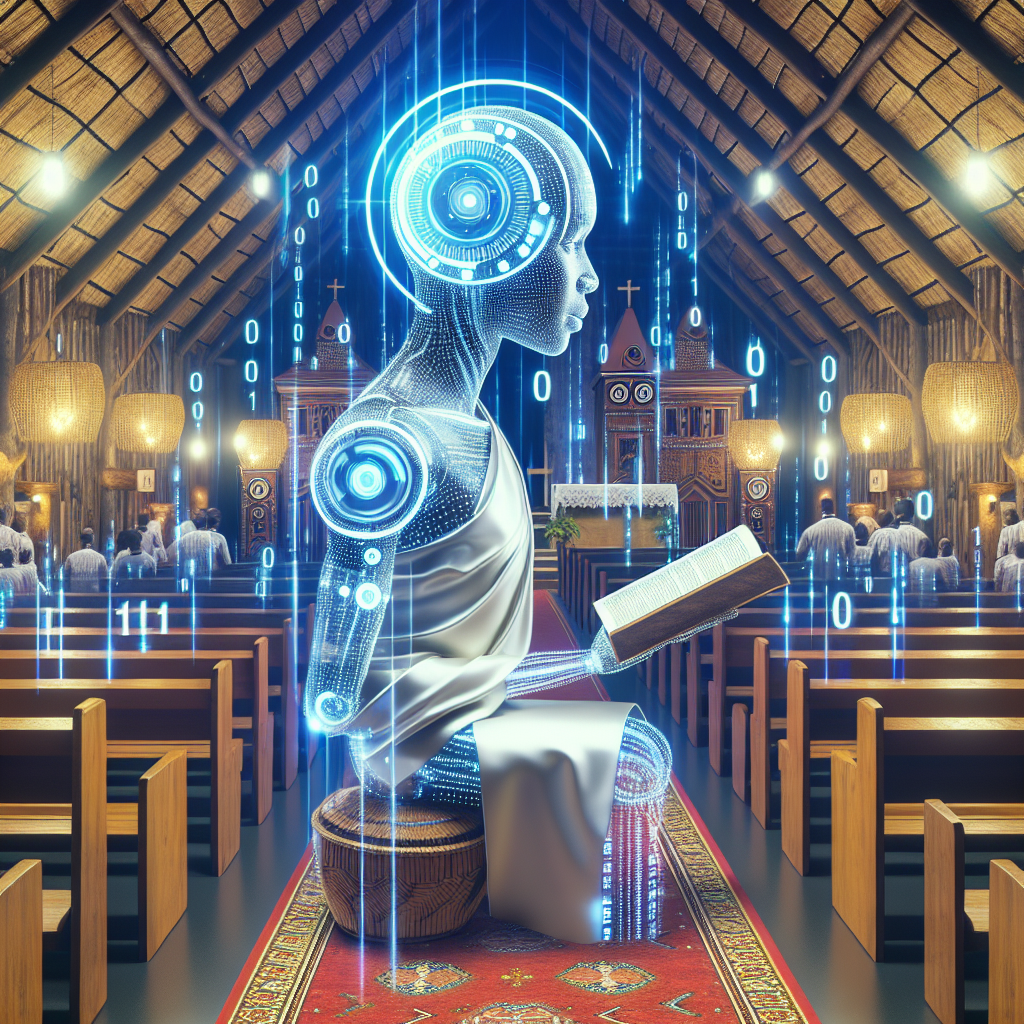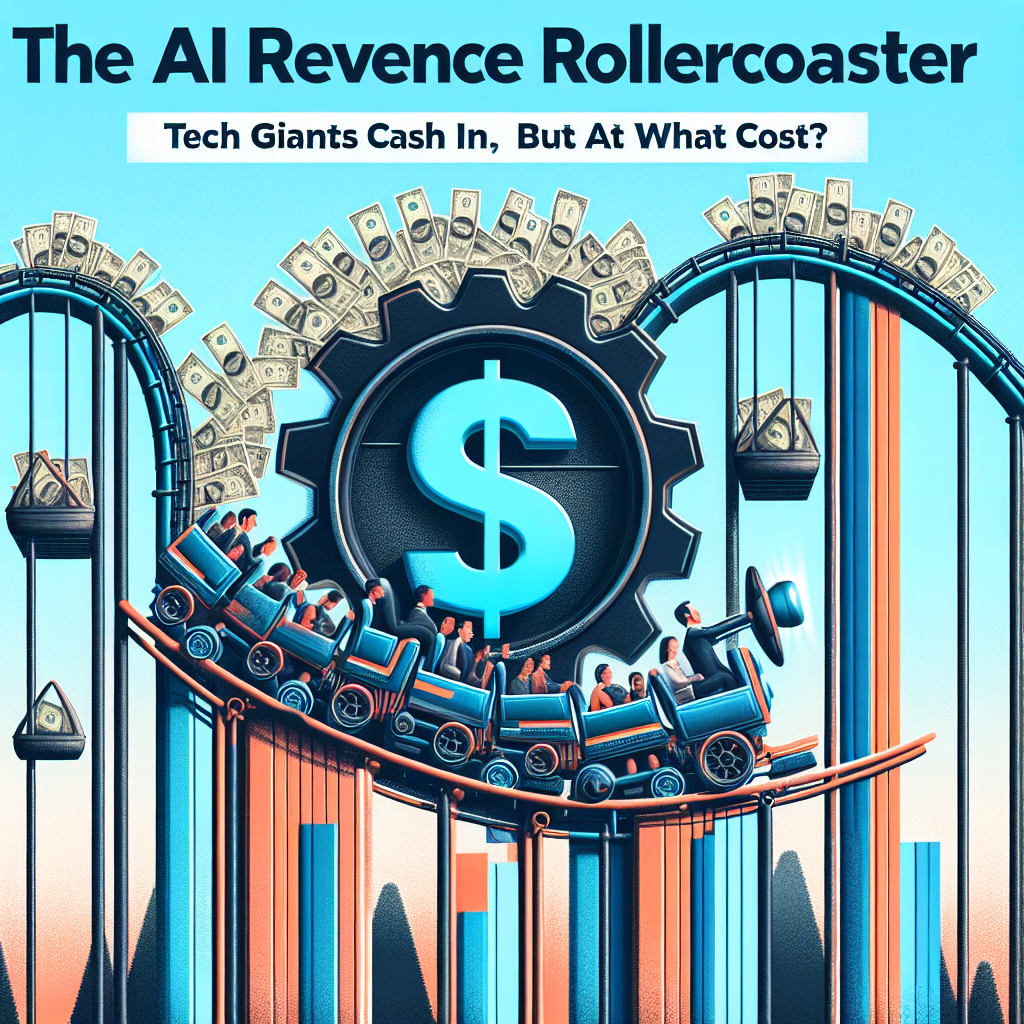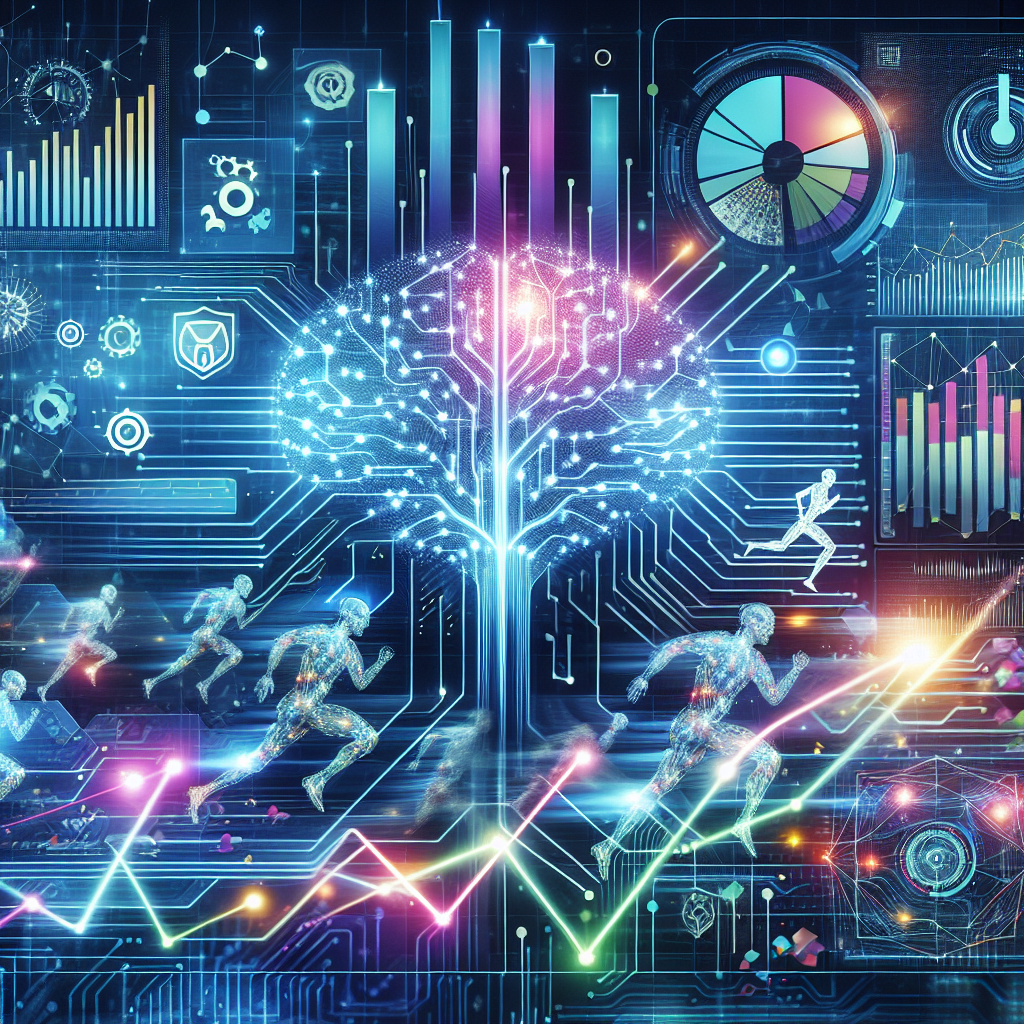The Rise of AI in African Churches: Blessing or Curse?
Artificial Intelligence (AI) has become a buzzword in recent years, captivating industries and societies worldwide with its potential to revolutionize various aspects of our lives. From self-driving cars to virtual assistants, AI is transforming the way we live, work, and interact. However, as this technology continues to advance, it is crucial to examine its implications for different sectors, including religion. In this article, we delve into the intersection of AI and the African Church, exploring the potential impact, challenges, and opportunities that arise from embracing this cutting-edge technology.
The African Church has long been a pillar of the continent’s social, cultural, and spiritual fabric. With millions of devoted followers and a rich history spanning centuries, it has played a significant role in shaping the lives of Africans. Now, as AI emerges as a powerful force in the global landscape, it raises thought-provoking questions about how this technology can be integrated into the African Church and what consequences it may bring. We will explore the potential benefits of AI in enhancing religious experiences, such as providing personalized spiritual guidance or facilitating remote worship. However, we will also address concerns surrounding the ethical implications of AI, the potential loss of human connection, and the impact on traditional practices and beliefs. Join us on this journey as we navigate the uncharted territory of AI and its implications for the African Church.
Key Takeaways:
1. AI can revolutionize the way the African Church engages with its members and communities.
2. Adoption of AI technologies can enhance the efficiency of administrative tasks and improve communication within the Church.
3. Ethical considerations must be taken into account when integrating AI in the Church, ensuring that human values and dignity are respected.
4. AI can provide opportunities for the African Church to reach a wider audience and engage with the youth in innovative ways.
5. Collaboration between the African Church and AI experts is essential to develop context-specific AI solutions that address the unique challenges and needs of African communities.
Controversial Aspect 1: The Role of AI in Religious Practices
One of the controversial aspects surrounding the integration of Artificial Intelligence (AI) in the African Church is the potential impact on religious practices. AI technology has the capability to automate certain tasks that were traditionally performed by religious leaders, such as sermon preparation, counseling, and even performing rituals. This raises questions about the role of AI in religious practices and whether it can replace or enhance the human element of spirituality.
Proponents argue that AI can be a valuable tool in assisting religious leaders by providing them with access to vast amounts of information, facilitating research, and offering personalized guidance to individuals seeking spiritual advice. They believe that AI can free up time for religious leaders to focus on more meaningful interactions with their congregation and provide deeper spiritual insights. Additionally, AI can help reach a wider audience through online platforms and social media, making religious teachings more accessible.
On the other hand, critics express concerns that relying too heavily on AI in religious practices may diminish the human connection and personal touch that is essential in spiritual guidance. They argue that AI lacks the emotional intelligence and empathy required to truly understand and address the complex needs and struggles of individuals. Moreover, they caution against the potential for AI to be manipulated or used for unethical purposes, as it may lack the moral discernment that religious leaders possess.
Controversial Aspect 2: Ethical Implications of AI in Decision-Making
Another controversial aspect of integrating AI in the African Church is the ethical implications of AI in decision-making processes. AI algorithms are designed to make decisions based on patterns and data analysis, which raises concerns about bias and fairness. When AI is used to make decisions within the church, such as selecting candidates for leadership positions or determining the allocation of resources, there is a risk of perpetuating existing inequalities or excluding certain groups.
Supporters argue that AI can help eliminate human biases and promote fairness by making decisions based solely on objective criteria. They believe that AI can provide a more transparent and accountable decision-making process, reducing the potential for favoritism or corruption. Furthermore, AI can help identify patterns and trends that humans may overlook, leading to more informed and effective decision-making within the church.
However, critics raise concerns about the lack of transparency and accountability in AI algorithms. They argue that the biases present in the data used to train AI systems can be perpetuated and amplified, leading to discriminatory outcomes. Additionally, they highlight the importance of human judgment and intuition in decision-making, which AI may not fully comprehend. Critics emphasize the need for careful oversight and regulation to ensure that AI is used ethically and in alignment with the values of the church.
Controversial Aspect 3: Impact on Community and Human Connection
The integration of AI in the African Church also raises questions about its impact on community dynamics and human connection. AI technology has the potential to create virtual communities and online platforms for religious engagement, which may alter the traditional sense of community within the church. While these virtual spaces can provide opportunities for global connections and knowledge sharing, they may also lead to a sense of isolation and detachment from physical communities.
Proponents argue that AI can enhance community engagement by connecting individuals across geographical boundaries and fostering dialogue and collaboration. They believe that AI-powered platforms can provide a space for individuals to share their experiences, seek support, and engage in meaningful discussions about faith. Additionally, AI can help identify and address the specific needs of different communities, leading to more targeted and effective outreach.
However, critics express concerns about the potential loss of human connection and the erosion of traditional community structures. They argue that face-to-face interactions and physical gatherings are essential for fostering a sense of belonging and shared experiences within the church. Critics caution against relying too heavily on virtual platforms and AI-mediated interactions, as they may not adequately replace the richness and depth of human connection.
1. The Rise of Artificial Intelligence in Africa
Artificial Intelligence (AI) is rapidly gaining prominence in various sectors worldwide, including Africa. The continent is experiencing a surge in AI adoption, with governments, businesses, and individuals recognizing its potential to drive economic growth and social development. From chatbots assisting customer service to machine learning algorithms improving healthcare diagnostics, AI is transforming industries across Africa.
2. AI and the African Church: A Complex Relationship
The African Church has a long-standing influence on the continent, shaping religious, social, and cultural norms. The advent of AI brings both opportunities and challenges for the African Church. On one hand, AI can enhance the Church’s outreach efforts, automate administrative tasks, and provide innovative tools for evangelism. On the other hand, it raises ethical concerns and questions about the impact of technology on spirituality, community, and the role of the Church in society.
3. AI and the Church’s Mission
The mission of the African Church is to spread the Gospel, promote social justice, and provide spiritual guidance. AI can play a crucial role in supporting these objectives. For example, AI-powered translation tools can help overcome language barriers, enabling the Church to reach diverse communities. Additionally, AI-driven data analytics can assist in identifying social issues and developing targeted interventions, aligning with the Church’s mission of addressing societal challenges.
4. Ethical Considerations in AI Adoption
As the African Church embraces AI, ethical considerations must be at the forefront. The Church needs to navigate potential ethical dilemmas, such as the impact of AI on human dignity, privacy, and the erosion of face-to-face interactions. It is essential to ensure that AI technologies align with the Church’s values and do not compromise the core principles of compassion, empathy, and human connection.
5. AI and Pastoral Care
Pastoral care is a fundamental aspect of the African Church, providing spiritual support and guidance to individuals and communities. AI can augment pastoral care efforts by offering personalized counseling through chatbots or virtual assistants. However, it is crucial to strike a balance between AI-driven support and the irreplaceable human touch that accompanies pastoral care.
6. AI and Worship Experiences
Worship experiences are central to the African Church, fostering communal worship, music, and rituals. AI can enhance these experiences through immersive technologies, virtual reality, and AI-generated music. However, it is important to ensure that technology does not overshadow the spiritual essence of worship and that it remains a tool rather than the focal point of religious practices.
7. AI and Social Impact
AI has the potential to address social challenges prevalent in Africa, such as poverty, healthcare access, and education. The African Church, with its extensive network and influence, can leverage AI to create innovative solutions. For example, AI-powered education platforms can provide quality education to underserved communities. The Church can also collaborate with AI developers to design ethical algorithms that prioritize social impact over profit.
8. AI and Theological Reflection
The integration of AI into the African Church prompts theological reflection on the nature of humanity, the role of technology, and the relationship between faith and science. The Church can engage in critical discussions, exploring theological frameworks that guide the responsible use of AI and its implications for humanity’s understanding of God’s creation.
9. AI and Job Displacement
AI adoption raises concerns about job displacement, particularly in sectors where AI can automate tasks traditionally performed by humans. The African Church, as a significant employer, needs to address the potential impact of AI on employment within the Church and its affiliated organizations. It must find ways to upskill and reskill individuals to adapt to the changing job market.
10. Collaborating for Ethical AI Development
To navigate the implications of AI, the African Church should collaborate with AI developers, policymakers, and ethicists to shape the development and deployment of AI technologies. By actively participating in discussions, the Church can advocate for ethical AI practices that align with its values and ensure that AI serves the common good of African societies.
Case Study 1: AI-Powered Sermon Preparation
In Nigeria, the Redeemed Christian Church of God (RCCG) has embraced artificial intelligence to enhance its sermon preparation process. With over 5,000 parishes worldwide, the church faces the challenge of providing relevant and engaging sermons to its diverse congregation. To address this, the RCCG partnered with a tech startup to develop an AI-powered sermon preparation tool.
The tool uses natural language processing and machine learning algorithms to analyze biblical texts, historical sermons, and contemporary Christian literature. It helps pastors and preachers generate sermon outlines, identify key themes, and offer relevant scripture references. By leveraging AI, the RCCG has been able to streamline and improve the quality of its sermon preparation, ensuring that its messages resonate with the congregation.
Case Study 2: AI-Driven Pastoral Counseling
In South Africa, the Methodist Church has implemented an AI-driven pastoral counseling system to provide support to its members. The system, called “CounselBot,” uses chatbot technology and sentiment analysis to engage in conversations with individuals seeking guidance or emotional support.
CounselBot is accessible through the church’s website and mobile app, allowing members to seek counseling at any time. The AI algorithm behind CounselBot has been trained on a vast database of counseling sessions, enabling it to provide empathetic responses and suggest appropriate coping mechanisms. The system also flags cases that require immediate attention from human pastors, ensuring that individuals in crisis receive timely support.
This AI-driven counseling system has been particularly beneficial for the Methodist Church, as it allows them to extend their pastoral care beyond physical church spaces. It has also helped reduce the stigma associated with seeking counseling, as individuals can engage with the chatbot in a private and non-judgmental environment.
Success Story: AI-Enhanced Bible Translation
One of the key challenges faced by the African Church is the translation of the Bible into local languages. This is a labor-intensive and time-consuming process that often requires extensive linguistic expertise. However, AI has emerged as a powerful tool to accelerate and improve the accuracy of Bible translation.
In Ghana, a team of linguists and AI researchers collaborated to develop an AI-driven translation system called “BibleBot.” This system uses machine learning algorithms to analyze existing Bible translations, linguistic patterns, and contextual information to generate accurate translations in local languages.
The impact of BibleBot has been significant. It has enabled the translation of the Bible into multiple local languages at a fraction of the time and cost compared to traditional methods. This has allowed churches to provide their members with scripture in their native tongues, fostering a deeper connection to the Word of God.
Furthermore, BibleBot has also facilitated the preservation of endangered languages by creating written records in these languages. This has been particularly important for communities that rely primarily on oral traditions, as it ensures the longevity of their cultural and religious heritage.
Overall, these case studies and success stories demonstrate the transformative potential of artificial intelligence in the African Church. From sermon preparation to pastoral counseling and Bible translation, AI is enhancing the church’s ability to connect with its congregation, provide support, and preserve cultural and religious traditions.
1. Natural Language Processing (NLP)
Natural Language Processing (NLP) is a subfield of Artificial Intelligence (AI) that focuses on the interaction between computers and human language. It enables machines to understand, interpret, and respond to human language in a way that is both meaningful and contextually appropriate.
In the context of the African Church, NLP can have significant implications. It can be used to develop AI-powered chatbots that can engage in conversations with churchgoers, providing them with information, answering their questions, and even offering spiritual guidance. These chatbots can be designed to understand and respond to natural language queries, making them more user-friendly and accessible to a wider audience.
1.1 Sentiment Analysis
Sentiment analysis is a specific application of NLP that focuses on determining the emotional tone of a piece of text. In the context of the African Church, sentiment analysis can be used to analyze social media posts, blog articles, or even sermon transcripts to gauge the overall sentiment towards specific religious topics or events.
By analyzing the sentiment, the African Church can gain insights into the opinions and emotions of its members and the wider community. This information can be used to tailor sermons, address concerns, or even identify areas where the church can improve its engagement with its followers.
1.2 Language Translation
Language translation is another application of NLP that can be of great value to the African Church. With the linguistic diversity present across the continent, language barriers can often hinder effective communication and understanding.
AI-powered language translation systems can help overcome these barriers by automatically translating sermons, religious texts, or even online content into different languages. This can enable the African Church to reach a broader audience, ensuring that the message of the church is accessible to individuals who may not understand the primary language used in the church.
2. Image and Video Recognition
Image and video recognition, another area of AI, involves training machines to understand and interpret visual content. This technology can have several implications for the African Church.
2.1 Facial Recognition
Facial recognition technology can be used to enhance security measures within the church premises. By utilizing AI-powered facial recognition systems, the church can identify individuals entering the premises, track attendance, and ensure the safety of its members.
Furthermore, facial recognition can also be used to personalize the worship experience. By analyzing facial expressions, the church can gauge the emotional response of its members during sermons or events, allowing for more tailored and impactful services.
2.2 Object Recognition
Object recognition technology can be utilized to identify and categorize religious artifacts, symbols, or artworks. This can be particularly useful in digitizing and cataloging the church’s historical and cultural heritage.
By automatically recognizing and tagging objects, the African Church can create a comprehensive digital archive, making it easier to preserve and share its rich history with future generations.
3. Predictive Analytics
Predictive analytics involves using historical data and statistical algorithms to make predictions about future events or outcomes. In the context of the African Church, predictive analytics can be used to gain insights into various aspects of church operations.
3.1 Attendance Patterns
By analyzing historical attendance data, predictive analytics can help the church understand attendance patterns and predict future attendance for different events or services. This can assist in resource planning, ensuring that the church is adequately prepared to accommodate its members.
3.2 Donor Behavior
Predictive analytics can also be applied to analyze donor behavior and predict donation patterns. By understanding the preferences and giving habits of its members, the African Church can develop targeted fundraising campaigns and optimize its resource allocation.
Overall, the integration of AI technologies, such as NLP, image and video recognition, and predictive analytics, can revolutionize the way the African Church engages with its members, enhances its services, and preserves its cultural heritage. By leveraging these technologies, the church can better address the needs and aspirations of its followers in the digital age.
FAQs
1. What is artificial intelligence (AI) and how does it relate to the African Church?
Artificial intelligence refers to the development of computer systems that can perform tasks that would typically require human intelligence. In the context of the African Church, AI can be used to enhance various aspects of church operations, such as pastoral care, worship experiences, and community engagement.
2. How can AI be applied in the African Church?
AI can be applied in various ways within the African Church. For example, it can be used to develop chatbots that provide instant pastoral support and guidance to church members. AI can also be utilized to analyze large amounts of data to gain insights into church attendance, giving patterns, and community needs.
3. Are there any ethical concerns with using AI in the African Church?
Yes, there are ethical concerns that need to be considered when implementing AI in the African Church. These concerns include issues of privacy, data security, and the potential for AI to replace human interaction and pastoral care. It is crucial for the church to approach AI implementation with careful consideration and ethical guidelines.
4. Can AI replace human pastors and leaders in the African Church?
No, AI cannot replace human pastors and leaders in the African Church. While AI can assist in certain tasks, such as providing information and support, it lacks the human touch and spiritual discernment that are essential in pastoral care and leadership. AI should be seen as a tool to enhance, rather than replace, the work of human pastors and leaders.
5. How can AI enhance worship experiences in the African Church?
AI can enhance worship experiences in the African Church through various means. For example, AI-powered music software can create dynamic and personalized worship playlists based on individual preferences. AI can also be used to develop immersive visual displays and virtual reality experiences that enhance the worship environment.
6. Will AI technology be accessible and affordable for all African churches?
Accessibility and affordability of AI technology in African churches can be a concern. However, with advancements in technology and increasing availability of AI tools and platforms, the costs are likely to decrease over time. Additionally, collaborations and partnerships between churches and technology providers can help make AI more accessible to a broader range of African churches.
7. How can AI be used to address social and community challenges in Africa?
AI can be used to address social and community challenges in Africa by analyzing data and providing insights that can inform decision-making processes. For example, AI can help identify areas of need within communities, such as healthcare or education, and guide the church in implementing targeted initiatives to address those needs.
8. What are the potential risks of relying too heavily on AI in the African Church?
Relying too heavily on AI in the African Church can pose risks such as the loss of human connection and empathy, potential bias in AI algorithms, and the depersonalization of spiritual experiences. It is important for the church to strike a balance between utilizing AI technology and maintaining the core values of human interaction and spiritual guidance.
9. Are there any successful examples of AI implementation in African churches?
While AI implementation in African churches is still in its early stages, there are some successful examples. For instance, some churches have used AI-powered chatbots to provide pastoral support and prayer requests. Others have utilized AI analytics to gain insights into their congregation’s needs and preferences, enabling more targeted ministry efforts.
10. How can the African Church ensure responsible and ethical use of AI?
The African Church can ensure responsible and ethical use of AI by establishing clear guidelines and principles for AI implementation. This includes ensuring transparency in data usage, protecting privacy, and regularly evaluating the impact of AI on the church community. Additionally, fostering ongoing dialogue and collaboration with experts in AI ethics can help the church navigate the complexities of AI implementation responsibly.
1. Stay informed about AI advancements
Keep yourself updated on the latest developments in the field of artificial intelligence. Follow reputable news sources, subscribe to AI-related newsletters, and participate in online forums or communities to stay informed about new technologies, trends, and their potential implications.
2. Understand the ethical considerations
Develop a strong understanding of the ethical considerations surrounding AI. Consider the impact of AI on privacy, employment, and social justice. Reflect on the potential biases and discrimination that can arise from AI algorithms and advocate for responsible AI development and deployment.
3. Embrace AI as a tool, not a replacement
Recognize that AI is a tool that can enhance human capabilities, not a replacement for human intelligence or empathy. Embrace AI technologies that can assist you in your daily tasks, but always remember the value of human connection and critical thinking.
4. Explore AI-powered applications
Explore and experiment with AI-powered applications that can enhance your productivity, creativity, and personal growth. Try using AI-based virtual assistants, language translation tools, or personalized recommendation systems to experience firsthand the benefits and limitations of these technologies.
5. Foster interdisciplinary collaborations
Engage in interdisciplinary collaborations to harness the potential of AI for social good. Collaborate with experts from diverse fields, such as computer science, social sciences, and theology, to explore the ethical, cultural, and theological implications of AI and develop innovative solutions to address societal challenges.
6. Advocate for AI education
Promote AI education and awareness within your community, especially among young people. Encourage schools, churches, and community organizations to integrate AI-related topics into their curriculum or organize workshops and seminars to educate others about the opportunities and challenges associated with AI.
7. Support local AI initiatives
Support and contribute to local AI initiatives in Africa. Invest in startups or organizations that focus on AI development and deployment in the African context. By supporting local initiatives, you can help shape the direction of AI in Africa and ensure it aligns with the needs and values of the African community.
8. Engage in policy discussions
Participate in policy discussions and advocacy efforts related to AI. Join organizations or initiatives that aim to influence AI policies and regulations to ensure they are inclusive, ethical, and promote the common good. By actively engaging in policy discussions, you can contribute to shaping the future of AI in Africa.
9. Consider the social impact of AI
Reflect on the potential social impact of AI technologies on marginalized communities in Africa. Consider how AI can exacerbate existing inequalities or create new ones. Advocate for AI solutions that prioritize inclusivity, fairness, and social justice, and work towards bridging the digital divide.
10. Reflect on the theological implications
Reflect on the theological implications of AI and its relationship with faith and spirituality. Consider how AI can be integrated into religious practices or how it challenges traditional understandings of human uniqueness and divine creation. Engage in theological discussions and reflections to deepen your understanding of AI’s place within the African Church.
Artificial intelligence (AI) presents both opportunities and challenges for the African Church. Throughout this article, we have explored the implications of AI in the context of the African Church and highlighted key points and insights. Firstly, AI has the potential to enhance the efficiency and effectiveness of various church activities, such as pastoral care, evangelism, and administration. AI-powered tools can automate repetitive tasks, analyze large amounts of data, and provide personalized experiences for church members. This can free up time for church leaders to focus on more meaningful and impactful activities.
However, the adoption of AI in the African Church also raises concerns. The potential loss of human connection and the ethical implications of AI decision-making are important considerations. The African Church must approach the integration of AI with caution, ensuring that it aligns with its core values and principles. It is crucial for the Church to actively engage in discussions and debates surrounding AI ethics and regulation to ensure that the technology is used in a responsible and ethical manner.
In conclusion, AI has the potential to revolutionize the African Church, but it must be approached with careful consideration. The African Church should embrace the opportunities that AI offers while being mindful of the potential risks and challenges. By harnessing the power of AI responsibly, the African Church can leverage technology to enhance its mission and impact in the digital age.




